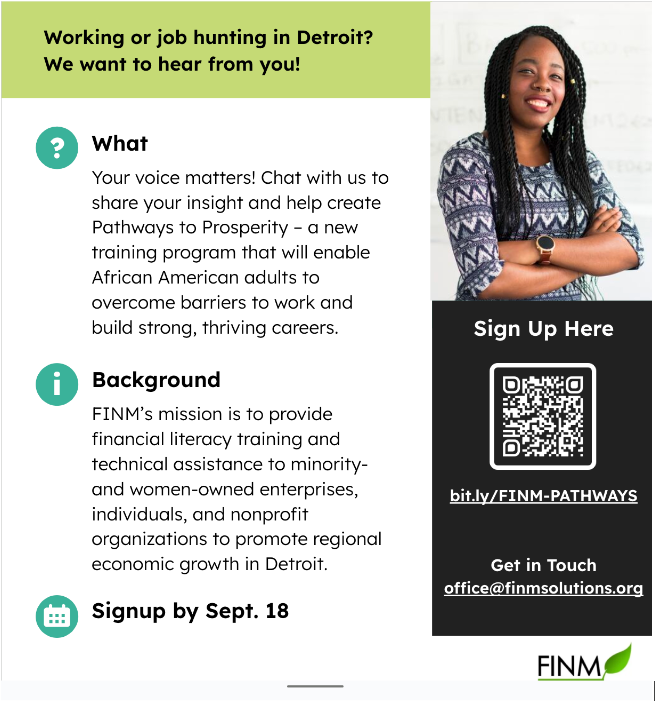Case Study
FINM Solutions
FINM Solutions partnered with Onlea's LX Labs research and strategy team to develop the "Pathways to Prosperity" program, a comprehensive employment readiness program aimed at empowering minority women in Detroit with the skills and support needed to succeed in the workforce. Onlea conducted extensive research and consulted on learner experience design, employing a human-centered approach to help FINM provide evidence to secure grant funding and ensure the program's adoption, effectiveness, and positive impact for the community.
Throughout this work, Onlea took an equity-driven, holistic approach, recognizing the interconnectedness of social, economic, and health factors.


Ensuring program adoption, effectiveness, and positive impact for the community.

Who is FINM Solutions?
FINM Solutions is a Detroit-based non-profit organization committed to fostering economic growth for Black, Indigenous, and People of Color (BIPOC) individuals and businesses.
To date, FINM has supported over 5,000 benefactors. Through financial literacy training, technical assistance, and workforce development programs, FINM bridges the gap between job seekers and employers.


The Challenge
Detroit faces significant economic and social challenges, with BIPOC women disproportionately affected by unemployment and underemployment. Existing training programs often lack the resources and flexibility to address the complex needs of this population, leaving many struggling to achieve financial stability and career advancement.
Based on stakeholder consultation, we synthesized the following guiding question:
What training interventions can provide the means to help BIPOC women living under the poverty line in the Detroit metropolitan area achieve job-readiness and financial stability

Our Solution

FINM worked with Onlea conducting extensive research and using a human-centered approach to secure funding and ensure the program's adoption, effectiveness, and positive impact for learners.



Throughout this work, Onlea took an equity-driven, holistic approach, recognizing the interconnectedness of social, economic, and health factors.
Key elements of Onlea's approach included:
In-depth Research: Onlea's team conducted a thorough analysis of the Detroit economic landscape, employment opportunities, and existing training programs. Focus groups with potential employers identified critical skill gaps and hiring challenges, while surveys, focus groups, and prototype co-creation with prospective trainees provided valuable insights into their goals, needs, and barriers.
Blended Learning Model: Based on our in-depth research and best practices of learning design, Onlea recommended a blended learning approach that combines the flexibility and scalability of self-paced online modules with the structure and support of in-person instruction and coaching. This model recognizes the diverse needs and challenges faced by the target population, including childcare responsibilities, transportation limitations, and varying levels of digital literacy.
Soft Skills Focus: Recognizing the crucial role of soft skills in today's workforce, Onlea recommended prioritizing training content focused on communication, professionalism, and networking. This curriculum directly addresses the needs identified by both employers and trainees, equipping participants with the interpersonal skills essential for success in a wide range of industries.
Case Management and Support Services: Onlea recognized the importance of wraparound support services to overcome barriers to training and employment. The program incorporates case managers who provide personalized guidance, connect participants with resources such as childcare and transportation assistance, and facilitate job placement.
Digital Badges and Microcredentials: To enhance motivation and provide tangible evidence of skill development, Onlea recommended incorporating digital badges and microcredentials into the program. These credentials allow participants to showcase their newly acquired skills to potential employers, increasing their job market competitiveness.
Employer Partnerships: Onlea advocated for establishing partnerships with employers to offer work-integrated learning opportunities such as internships and apprenticeships. These partnerships not only provide participants with valuable real-world experience but also create direct pathways to employment and address employer concerns about employee retention and upskilling.
The Results
Onlea's work with FINM Solutions exemplifies its commitment to leveraging technology and innovative learning design to create a more just and equitable society.
Our contributions to the development of the “Pathways to Prosperity” program laid a strong foundation for its success. The research findings and design recommendations provided a roadmap for creating a program that is relevant, accessible, and impactful for both trainees and employers.
Client Feedback
“Impressed with the final report!” “Really appreciate the content and completeness of the report.”
“Very clear what the data says.” “We are a data-driven organization and this helps us define our next steps.”
Key outcomes of Onlea's engagement:
Deep understanding of the target population's needs and barriers. A research-backed program design framework that prioritizes flexibility, support, and skill development. Identification of potential employer partners and work-integrated learning opportunities. Actionable findings report and testimonials for grants and funding applications.
Onlea’s expertise in designing and implementing training programs that are learner-centric, culturally relevant, and outcomes-oriented positioned them as a valuable learning partner for FINM Solutions. Our commitment to accessibility and inclusion aligned perfectly with FINM’s mission of empowering BIPOC women and fostering economic opportunity in Detroit.
To learn more about this program, visit FINM's website: Pathways to Prosperity